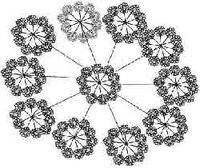Template:Churche: Difference between revisions
No edit summary |
No edit summary |
||
| Line 1: | Line 1: | ||
[[Image:Fract10s-100sc.jpg|300px|right|thumb|link=The Living Network|The original meaning of the word from which the word [[Churche]] is derived includes the concept of a circle. To some, this is "because the congregations were gathered in circles." The predominant form of government throughout history has been based on voluntary systems like the [[Tens|tens, hundreds, and thousands]].]]. | |||
== Churche == | == Churche == | ||
Anglo-Saxon 'circe', a small church, with 'circol', a circle. It is "Kirche," in England, it is the word "Circe" and in most English versions as a rendering of the Greek word [[ekklesia]]. Before that Circe was a goddess of sorcery (pharmakeia) who was skilled in the magic of transmutation, illusion, and necromancy. And her name is derived from the Greek verb kirkoô meaning "to secure with rings" or "hoop around"--a reference to the binding power of magic. | Anglo-Saxon 'circe', a small church, with 'circol', a circle. It is "Kirche," in England, it is the word "Circe" and in most English versions as a rendering of the Greek word [[ekklesia]]. Before that Circe was a goddess of sorcery (pharmakeia) who was skilled in the magic of transmutation, illusion, and necromancy. And her name is derived from the Greek verb kirkoô meaning "to secure with rings" or "hoop around"--a reference to the binding power of magic. | ||
Revision as of 01:28, 28 May 2018

.
Churche
Anglo-Saxon 'circe', a small church, with 'circol', a circle. It is "Kirche," in England, it is the word "Circe" and in most English versions as a rendering of the Greek word ekklesia. Before that Circe was a goddess of sorcery (pharmakeia) who was skilled in the magic of transmutation, illusion, and necromancy. And her name is derived from the Greek verb kirkoô meaning "to secure with rings" or "hoop around"--a reference to the binding power of magic.
- "the derivation of the word 'church' is uncertain. It is found in the Teutonic and Slavonic languages and answers to the derivatives of ekklesia, which are naturally found in the romance languages and by foreign importation elsewhere. The word is generally said to be derived from the Greek kyriakos, meaning the lord's house. But the derivation has been too hastily assumed. It is probably associated with the Scottish kirk, the Latin circus/circulous, the Greek klukos, because the congregations were gathered in circles."[1]
One Ring to bring them all and in the darkness bind them[2]
God has always desired to set the people free from sin like the covetous practices which makes the people merchandise to the Fathers of the earth like Cain, Nimrod, Pharaoh, and Caesar.
Their offer of benefits and Free bread like Food Stamps, Social Security and welfare all provided through forced contributions not only makes the word of God to no effect they also are a snare and a trap.
- Psalms 69:22 Let their table become a snare before them: and that which should have been for their welfare, let it become a trap.
- Romans 11:9 And David saith, Let their table be made a snare, and a trap, and a stumblingblock, and a recompence unto them:
Our desire to rule over our neighbor, to live at the expense of our neighbor, to extract security and benefits from others at the point of the sword brings us under the sword. If we are willing to bite one another we will be devoured.
The Modern Christian's imagination is often steeped in a distorted view of the Early Church. They have many ideas about Religion but none of them include "Pure Religion unspotted by the world". They have essentially made Christianity something it was never meant to be. They claim they want to get back to the roots of the early Christians but they hesitate to find out what the early Church was actually doing.